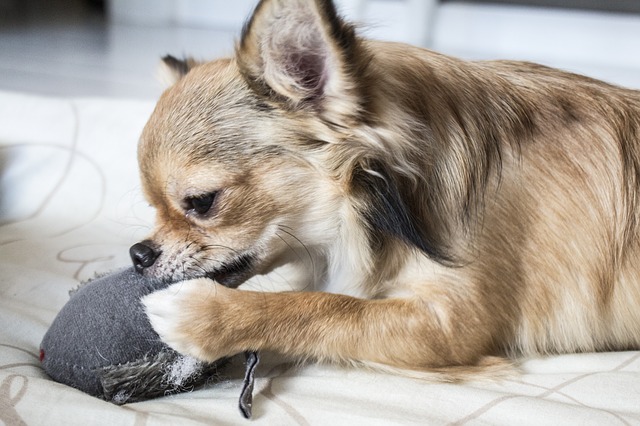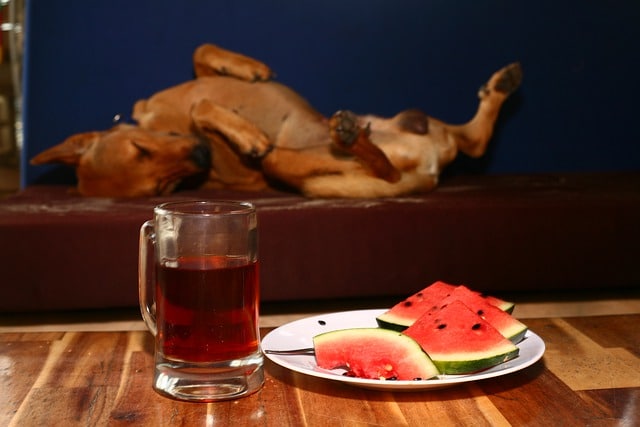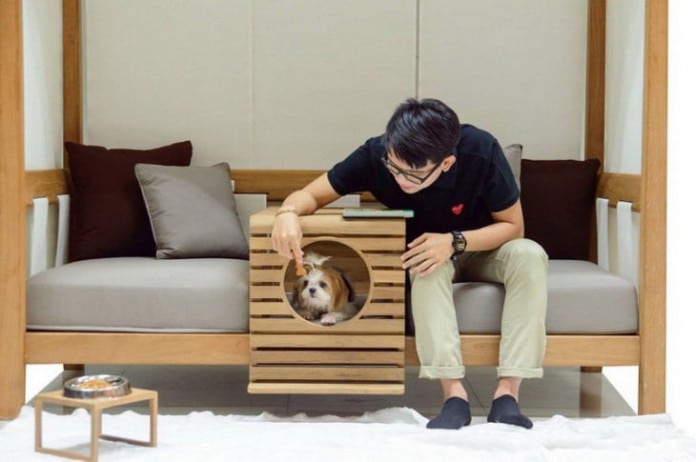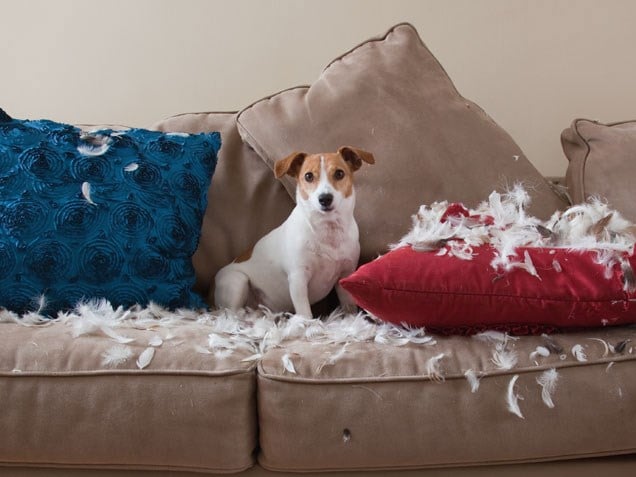Like newborns, puppies go through the rough stage of teething where they seem to chew everything on sight. New pet owners are seldom prepared for this nightmare. Buying chewing toys at this point can be a weekly (or daily) affair. If you don’t, everything (your shoes, sofas, flip flops, work shoes) will be converted into toys. It’s even more upsetting if your pup bites you or worse, your children every moment they get. This is a frustrating and overwhelming time, to say the least. Anyone in such a situation can’t wait for the stage to pass so that peace and calm can return. So, when do puppies stop chewing everything?
The Short Answer:
Puppies technically stop chewing after they’ve grown a full set of teeth, usually by the age of 7 months.
The Long Answer:
When new teeth are piercing through the jaws, it can be quite painful. Chewing helps to relieve the pain and make the process bearable. Teething problems will go away as soon as all the 42 permanent teeth have grown.
Ideally, puppies start the teething process as early as three weeks. By six weeks, many will already have their deciduous teeth (which are 28 in most dogs). The incisors and canine teeth come first before the premolars. Once they turn three months, these will begin to fall off and will be replaced by permanent teeth, three months later. After your dog acquires all his teeth, he will gradually stop chewing as the discomfort goes away.
The Other Side of the Coin

Destructive behavior is mainly brought about by teething. However, there are a few more reasons why dogs chew. These include the following:
- Natural Instinct: Dogs have a natural instinct to chew. When they don’t meet this need, they tend to go crazy and create a mess.
- Separation Anxiety: If you have a breed that gets destructive when they are bored, trust him to tear the house apart when you are away. You can tell it is separation anxiety if you notice restlessness, whining, barking, defecation, urination, and pacing.
- Exploration: When your puppy has some pent-up energy, he might release it by going on a chewing frenzy.
- Hunger: Sometimes the cause of destructive chewing is an empty stomach. If you restrict the calories of your dog, he will tend to chew on objects that smell like food.
When Does The Behavior Stop?

This is hard to tell. The answer will heavily depend on the actual breed and individual dog. There are certain breeds that carry the behavior pretty much all their lives. These include hunting and sporting dogs such as setters and retrievers. Terriers tend to get bored fast as well and will often resort to destructive chewing to kill boredom.
In addition, toy breeds have been known to hold on to deciduous teeth long after they were supposed to have fallen out. This also applies to those with pushed-in faces and round skulls (brachycephalic breeds). If deciduous teeth don’t fall out, it will create a crowding problem when permanent teeth occupy their place in the jaw. This is often a very uncomfortable situation for any dog. Retained teeth can cause him to chew all of his life. It is also a cause for a number of oral problems such as misaligned teeth and tooth decay.
What Can You Do?

Being bitten, having your house torn apart, and the constant worry of having your fur baby ingest something toxic can wreak havoc in your mind. While there’s very little you can do to speed up the process of teething, you can discourage the destructive chewing behavior to a greater extent. Essentially, if your puppy is experiencing the other reasons (separation anxiety, boredom, exploration, and hunger), the ball is in your court. Give him plenty of company, revise his diet, and provide enough exercise for physical and mental stimulation.
Else if teething is the issue, train him to stop any destructive behavior. Most importantly, satisfy his need to chew by giving him appropriate toys. Keep a large collection of puzzle games, chew toys, and safe fluffy toys. Vets recommend 10-15 toys at one time. This will cost you a pretty coin but it is nothing compared to replacing your couch, expensive shoes, and remote control every week. Finally, if he has retained teeth, plan to have them removed surgically.
Recommended Dog Toys
Check these posts for the types of toys you can buy for your puppy:
Top 10 Freezable Teething Toys for Puppies
10 Best Heartbeat Dog Toys
15 Best Dog Toys You Can Put Peanut Butter in
8 Best Chew Guard Technology Dog Toys
15 Best No Squeaker Dog Toys
10 Best Toys for Goldendoodles
Most importantly, remove all objects that may be hazardous to your puppy. For instance, put all household cleaners, chemicals, and potentially toxic plants out of reach for your curious puppy. Strive to cover all electrical cords or make them as inaccessible as possible because your puppy can get electrocuted when he tries to chew on them. Additionally, remove all objects of curiosity that you think may appeal to your puppy including shoes, children’s toys, and socks among others. Finally, consider crating your puppy when you are away or when there is nobody around to supervise him.
Final Thoughts
The teething stage is difficult for both you and your brand new puppy. Apart from destroying your prized possessions, your dog might harm his own health as well. Most dogs outgrow the teething stage by seven months. If it persists after this, you might want to have your puppy checked by the vet to rule out any medical problem. And if you have any health-related question about your dog’s behavior, your vet is the right person to contact as he can examine your pup, check his past health history, and recommend for you the best course of action to take.
Related Post:
Do Puppies Lose Their Fang Teeth?
15 Things You Probably Didn’t Know About Dogs That Eat Rocks
As an Amazon Associate, we may receive a small commission from qualifying purchases but at no extra cost to you. Learn more. Amazon and the Amazon logo are trademarks of Amazon.com, Inc, or its affiliates.

